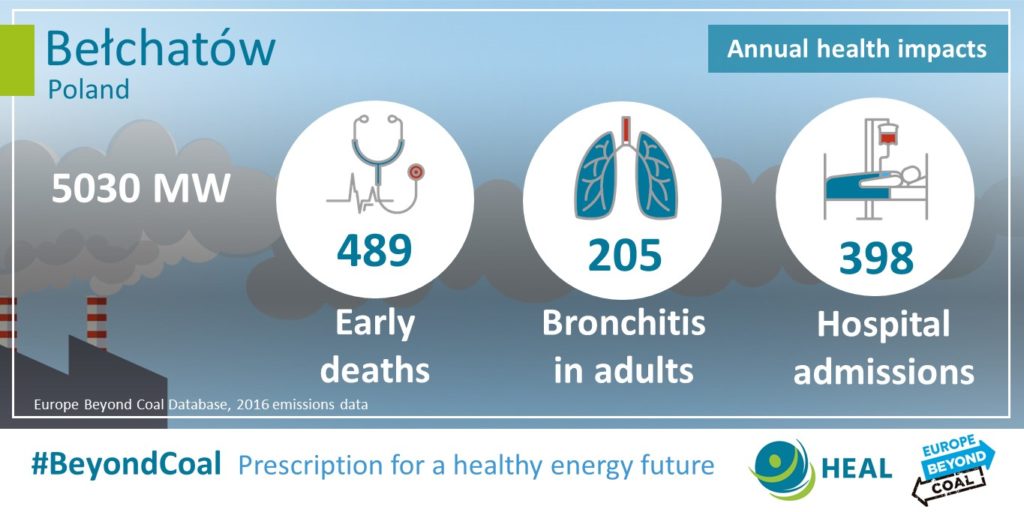The Green 10 coalition, which HEAL is a part of, encourages the President of the European Parliament Roberta Metsola upon her re-election to put the climate, biodiversity and pollution emergency at the forefront of her tenure.
By Weronika Michalak, HEAL Poland Director
This week saw the first announcement of the intention to close the Polish Belchatow coal power plant, operated by the state-owned Polish Energy Group (PGE) by 2036.
This proposal marks an historic turning point for health in Poland and beyond, as the Bełchatów Power Plant with a total capacity of over 5 GW is the EU’s most health-harming coal power plant.
Each year, the plant emits over 30 million tons of CO2 emissions, and thousands of tons of hazardous air pollutants, including particulate matter and mercury. In 2016 alone, operations at Belchatow led to a staggering health bill of 489 premature deaths, 141,993 lost work days, 205 cases of chronic bronchitis in adults, 7,864 asthma attacks in children, 398 hospitalizations, with health costs of up to 1.42 billion EUR (see HEAL briefing “Just Transformation for the Protection of Public Health”). But these numbers are ‘just’ annual ones, meaning the plant has generated a huge unpaid health bill as it has been running for decades. A bill the public has had and continues to have to pay.
 Health groups including HEAL have long voiced concern over Belchatow’s pollution and health toll. In the 2013 “Unpaid Health Bill” report, we highlighted the price we have to pay for our chronic dependency on coal-fired energy and we recommended a European coal phase out, to prevent premature death, respiratory and cardiovascular disease, cancer and other ill-health.
Health groups including HEAL have long voiced concern over Belchatow’s pollution and health toll. In the 2013 “Unpaid Health Bill” report, we highlighted the price we have to pay for our chronic dependency on coal-fired energy and we recommended a European coal phase out, to prevent premature death, respiratory and cardiovascular disease, cancer and other ill-health.
Therefore, the Belchatow closure announcement is a milestone for better health protection for the people in Poland and beyond, and shows that there is a growing recognition that coal cannot have a place in a healthy energy future for Poland, or elsewhere. At the same time, there’s no reason for leaning back, as we have not reached our goal of a coal phase out in the EU by 2030 yet – a date that is scientifically proven to be needed to slow down the climate crisis.
The closure dates proposed in the Territorial Just Transition Plan of the Lodz Region (where Belchatow is located) lie in a too distant future. The closure timeline envisaged is: 2030 – 1 block, 2031 – 1 block, 2032 – 2 blocks, 2033 – 2 blocks, 2034 – 3 blocks, 2035 – 2 blocks and 2036 – 1 block, while the end of the currently ongoing lignite mining in the Bełchatów and Szczerców fields are set for 2026 and 2038, respectively.
As the Polish government and regional authorities are looking to access millions of funds from the EU, e.g. through the Recovery and Just Transition Funds, they have to set a more ambitious coal phase out date of 2030.
Every day with less pollution counts, especially as many harmful air pollutants can stay in the environment for a long time, and can lead to disease only much later in life. In addition, there is an urgent need to step up on climate mitigation for health.
In Europe, coal power plants are the largest source of mercury emissions. Mercury is a heavy metal that is particularly harmful to the healthy development of our children. In 2016 alone, coal combustion in Belchatow led to the staggering release of 2.8 tonnes of mercury, and some estimate that the amount was even higher. This mercury ends up in our bodies again. Studies show that for children, methylmercury exposure in early life can lead to IQ loss, which may not be much for an individual child, but as so many children are affected, has significant economic consequences.
With the COVID-19 pandemic, the protection of health has become the top priority of policy-makers and the public alike. A swift coal phase out is the opportunity for decision-makers for real disease prevention and health promotion.


